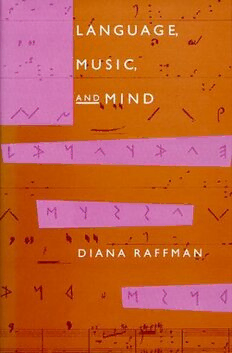
Language, Music, and Mind PDF
182 Pages·1993·0.953 MB·
Most books are stored in the elastic cloud where traffic is expensive. For this reason, we have a limit on daily download.
Preview Language, Music, and Mind
Description:
Taking a novel approach to a longstanding problem in the philosophy of art, Diana Raffman provides the first cognitivist theory of the nature of ineffable, or verbally inexpressible, musical knowledge. In the process she also sheds light on central issues in the theory of mind. Raffman invokes recent theory in linguistics and cognitive psychology to provide an account of the content and etiology of musical knowledge that "can not be put into words." Within the framework of Lerdahl and Jackendoff's generative theory of music perception, she isolates three kinds of ineffability attending our conscious knowledge of music - access, feeling, and nuance ineffability - and shows how these arise. Raffman makes a detailed comparison of linguistic and musical understanding, culminating in an attack on the traditional idea that human emotions constitute the meaning or semantic content of music. She compares her account of musical ineffability to several traditional approaches to the problem, particularly those of Nelson Goodman and Stanley Cavell. In the concluding chapter, Raffman explores a significant obstacle that her theory poses to Daniel Dennett's propositional theory of consciousness. Diana Raffman is Assistant Professor of Philosophy at the Ohio State University.
See more
The list of books you might like
Most books are stored in the elastic cloud where traffic is expensive. For this reason, we have a limit on daily download.
